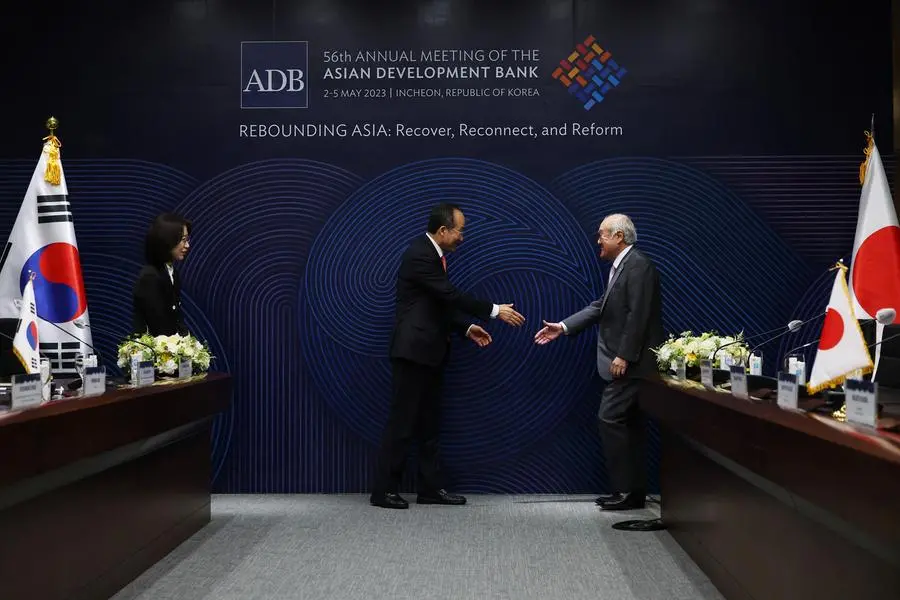PHOTO
Japan and South Korea held their first finance leaders' meeting in seven years on Tuesday and agreed to resume regular dialogue, as tensions in the region and slowing growth prod them to increase co-operation and mend strained relations.
The resumption of bilateral financial discussions comes ahead of Japanese Prime Minister Fumio Kishida's planned visit to South Korea next week for talks with President Yoon Suk Yeol.
It also came as Asian policymakers, gathering for the annual Asian Development Bank (ADB) meeting this week in the South Korean city of Incheon, discuss regional economic challenges and ways to beef up buffers against various shocks.
"Japan and South Korea are important neighbours that must cooperate to address various challenges surrounding the global economy, as well as the regional and international community," Japanese Finance Minister Shunichi Suzuki said at the meeting with his South Korean counterpart Choo Kyung-ho.
"As for geo-political challenges, we're experiencing incidents like North Korea's nuclear missile development and Russia's invasion of Ukraine. Japan sees these as unacceptable, and something the two countries must address together," he said.
Choo said the two countries can strengthen private and government partnerships in high tech industries such as semiconductors and batteries.
Japan and South Korea will resume regular finance dialogue, likely to be held annually, at "an appropriate timing," Suzuki told reporters after the bilateral meeting.
Choo is expected to visit Japan this year for another meeting with Suzuki, South Korea's finance ministry said.
Despite slowing growth in advanced nations, developing Asia is expected to achieve strong economic growth of 4.8% in 2023, faster than 4.2% growth in 2022 thanks to China's rebound, according to the ADB projections.
But various risks cloud the region's economic outlook.
"Despite the close economic relationships among China, Japan, and Korea, we have observed a recent slowdown in economic relations, particularly in terms of trade in goods and services," the finance leaders of the three countries said in a statement issued after their trilateral meeting on Tuesday.
At the trilateral meeting, China's finance minister and the head of the People's Bank of China were not present and represented by their deputies.
DEFUSING RISKS
The recent failures of two U.S. banks have alarmed policymakers about vulnerabilities in the global banking system and the possibility of market turbulence as a result of aggressive U.S. interest rate rises.
Building stronger buffers against shocks will be among key topics of debate when finance ministers and central bank chiefs of the bigger ASEAN+3 group - which comprises the 10-member Association of Southeast Asian Nations (ASEAN) and Japan, China and South Korea - meet later on Tuesday.
While Asian policymakers stress their countries have sufficient foreign reserves and buffers to fend off another crisis, they may see scope for enhancements to arrangements to combat market upheaval, analysts say.
Japan, which co-chairs this year's ASEAN+3 meeting with Indonesia, hopes to discuss a network of currency swap lines called the Chiang Mai Initiative Multilateralisation (CMIM).
Indonesian Finance Minister Sri Mulyani Indrawati, co-chair of the meeting, said the cooperation of member states on the CMIM and other initiatives was vital for regional development and prosperity.
Specifically, Tokyo is keen to propose a facility that enhances the use of existing currency swap lines and allows members to tap funds in emergencies, said three sources with direct knowledge of the matter. (Reporting by Leika Kihara and Jihoon Lee Editing by Chang-Ran Kim, Sam Holmes and Shri Navaratnam)





















